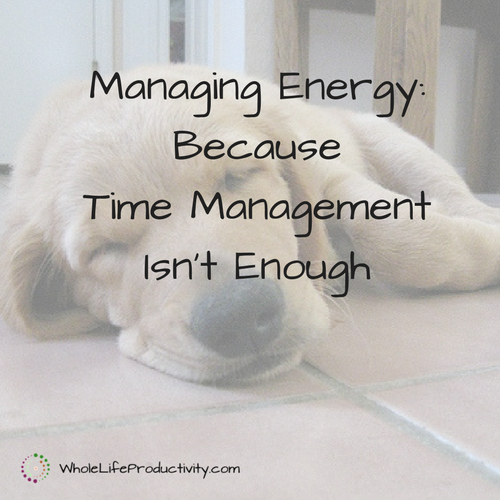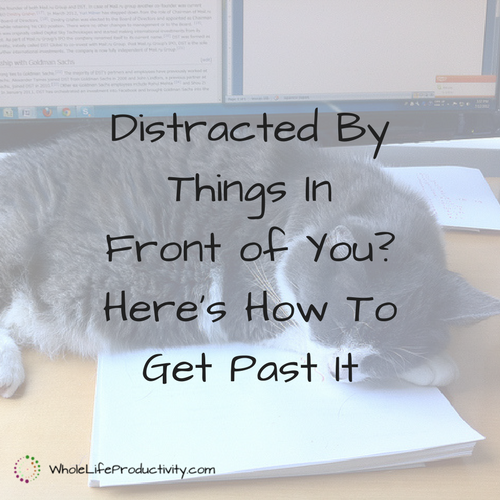
Managing Energy: Because Time Management Isn’t Enough
Have you ever cleared your schedule to do something important – and then not done it because you didn’t have the energy? Time management isn’t enough. It’s important, but you also have to think about managing energy.
I’ve been struggling with this lately, because my 12 Week plans are going well. Yet at the end of the work day I am too tired to actually do much of my list, and I either take a nap (bad) or sit down to unwind and read (worse). So that leaves me with a bunch of tasks I have to get done on the weekend to stay on track, which is not a good strategy for recharging, and I hit Monday tired. It’s a cycle that seems to be ongoing, and I realized that I had to do something.
Why Time Management Isn’t Enough
The best laid time management plan means absolutely nothing if it isn’t executed. And one of the biggest factors as to whether something gets done is whether you have the energy to do it.
To a certain extent we can force ourselves to do tasks that we think we are too tired to do, but we have to have an ongoing plan to keep that energy at a level where we can maximize our productivity.
It’s like going on a trip: if you plan it extensively, you’re not going to get out of the driveway if you don’t have fuel in the gas tank.
The Importance of Energy Management
Managing energy is unlike managing other things, such as time. You have to take into account other factors than simple tasks. You have to take into account things like sleep deficits, diet, sleep quality, caffeine, physical health and even things like the weather!
But without managing that energy, you’re not going to get much done.
Managing Energy Factors
So where do we start? The following list is not meant to be exhaustive, but rather give you a start in thinking about managing your energy.
Sleep/Rest
One of the biggest factors in energy is how much and how well you are resting. There are quite a few apps (Sleep Cycle (iOS) and Sleep As Android (Android)) as well as devices (Fitbit*, Apple Watch*)
Tracking your sleep length and quality using an external device or app may show you some surprising things – such as the actual time you are asleep or your restlessness. It’s much more reliable than using the empirical data of what you think happens.
Further reading:
- How to Get Better Sleep (and Need Less Every Night)
- Sleep tips: 6 steps to better sleep – Mayo Clinic
Food
One of the most common self-administered antidotes to low energy is to grab caffeine or a high-sugar snack. While this will rev you up in the short term, it will also have a corresponding dip later, which can sap your energy even further.
While there are some general guidelines, individuals react to different foods differently. I can’t eat potatoes or rice at lunch or I will crash hard at about 2 pm. Other people can handle the Chinese buffet or french fries with little effect. Logging your food is the best way to track these individual trends.
Further reading:
- 20 Reasons for Blood Sugar Swings (No. 11 Might Surprise You!)
- 30 Foods for All-Day Energy | Eat This Not That
- Afternoon Slump at Work: 18 Tips to Beat It | Reader’s Digest
- 5 foods that cause a slump in energy, Food News & Top Stories – The Straits Times
Exercise
The last thing most people want to do when tired is to exercise. Yet even taking a short walk can rev your energy level, and have great impacts on your ability to focus.
Some ways to sneak in a quick walk: take the long way to the bathroom; walk down to the ground floor of your office building and take the elevator back up; set up meetings in rooms that are not right where your team is.
Further reading:
Natural Cycles
Managing energy also requires that you be aware of your natural cycles. Some people naturally hit their peaks in the morning, and some hit them at night (early birds and night owls).
There is some noise about genetic components that may swing you one way or the other, and theories that say there are people who are neither. While there are techniques can help you function better at your non-optimal times, it is easier to know your rhythms and work with them.
Further reading:
- 8 Scientific Facts about Early Birds versus Night Owls | ActiveBeat
- 18 Things You’ll Get If You’re Not An Early Bird Or A Night Owl
- Can a night owl become an early bird?
Conclusion
If you find yourself struggling with your energy levels, pick an area above and see what you can do. It’s not hard to manage energy to get yourself back to the point where you can tackle your tasks.
Like this article? Share it on social media.
Image by fltmech98. Licensed under Creative Commons. Text added.




